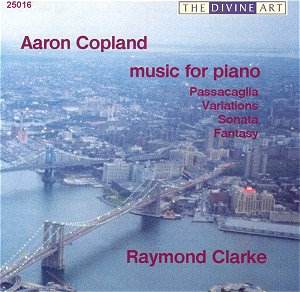Raymond Clarke’s recordings
of Shostakovich
and Szymanowski
have brought forth critical acclaim
(both were issued on the Athene label).
This all-Copland disc from Divine Art
does not disappoint. It gathers together
four major pieces on one disc of 77
minutes’ playing time. Divine Art provide
faultless production values, from the
entirely apposite and tasteful cover
of New York (taken from the top of the
World Trade Center, destroyed 10 days
after this recording session), to the
booklet notes by the pianist himself.
From the recording information given
by Divine Art, this disc was put down
in one day. If that is indeed the case,
Clarke’s achievement is all the more
remarkable.
The four pieces are
played in chronological order. The Passacaglia,
written while the composer was in his
early twenties and dedicated to his
then teacher Nadia Boulanger, works
remarkably well, not least perhaps because
the formal constraints of the chosen
form rein in Copland’s manner (he can
on occasion show a propensity towards
the diffuse). Clarke gives a strong
yet carefully shaded account that grows
to a very imposing ‘processional’ towards
the end. The recording, also, is beyond
criticism, full and spacious yet detailed.
The Variations
brings immediate contrast. Here a sparer,
quasi-atonalist, almost Webernian atmosphere
elicits a more muscular performance
from Clarke (which also, however, includes
some delicate pianissimo playing). The
conceit of putting the first Variation
before the exposition of the theme itself
is not mere compositional trickery,
but entirely in keeping with the elusive
ethos of the work. Every note not only
speaks but is carefully weighted in
this performance.
The Piano Sonata
is a major work (Bernstein, no less,
recorded it for RCA early in his career).
It is true that Clarke here comes directly
in competition with Leon Fleisher (Philips
Great Pianists of the Twentieth Century
456 775-2), but taken in the context
of the present programme he is entirely
convincing. Clarke emphasises the contrasts
of this piece, being meltingly, hauntingly
lyrical at times, spikily rhythmic at
others. More than anything, though,
he brings out the granite-like structure
of the work, enjoying the spiky, dance-like
rhythms along the way. If the middle
movement (Vivace), is more immediately
approachable, the finale is contrastingly
bare, more ‘lonely’ music. The immensely
delicate close is guaranteed to haunt
the memory.
The mere title of Piano
Fantasy probably will not prepare
the unwary for a 33-minute piece. Nevertheless,
that’s what it is. Dedicated to the
memory of William Kapell, its proclamatory
opening is enough to wake one up after
the dream-like dissolve of the Sonata’s
close. Despite its length, it is compelling
from first to last. Clarke is completely
unapologetic in his ruggedness, which
makes the evocations of calm all the
more effective. It was a brave, yet
it turns out inspired, decision to end
the recital with this work.
My recording of the
month, without a shadow of a doubt.
For anyone who has yet to experience
the wonders of Copland’s music for piano,
here is the place to start.
Colin Clarke
